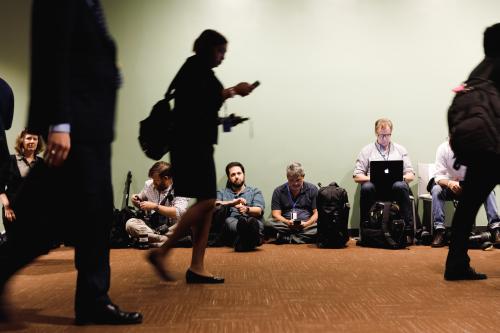During last year’s U.S.-Africa Leaders Summit, the Obama administration committed to a long-term extension of AGOA (the administration has since called for a 15-year extension) and several other enhancements, including an update of the eligibility criteria and review process.
With AGOA set to expire on September 30, 2015 the legislation needs to be renewed as soon as possible in its current form to ensure that American companies follow through on their plans to place orders with manufacturers and build factories in AGOA-eligible countries.
Once AGOA is extended, we need to continue to refine our commercial approach to the continent—and addressing eligibility criteria is an important part of that debate. We noted with interest, therefore, the recent piece by Ben Leo of the Center for Global Development who contends that the U.S. has failed to use AGOA eligibility or conditionality to push for improvements in the business environment in AGOA-eligible countries. According to Leo, a lack of competitiveness of businesses in sub-Saharan Africa is the main barrier to exporting. He argues that the U.S. should condition access to AGOA on governments in sub-Saharan Africa improving their business environment and be prepared to withdraw AGOA eligibility should they fail to do so.
We agree that the business environment in many countries in sub-Saharan Africa is a significant constraint on businesses that aim to be competitive globally. However, we do not think that using AGOA-eligibility in this way will produce these results. Such conditionality would deter U.S. trade and investment in Africa and create more uncertainty on how to access the African market.
The most effective way to improve the business environment in AGOA-eligible countries is to have the U.S. private sector engage in focused dialogue with relevant officials, with the active support of the U.S. embassy and others in Washington to remove bottlenecks to trade and investment. Leo’s approach would have a minimal effect of improving the business environment in sub-Saharan countries and would reduce the opportunity that AGOA provides countries to grow their economies through trade. Moreover, it would introduce more bureaucracy into an environment that needs less of it.
In order for a country in sub-Saharan Africa to be eligible under AGOA requires fulfilling the following criteria:
- Making progress towards a market-based economy, the rule of law, the elimination of trade barriers, and systems to combat corruption and protect worker’s rights
- Not engaging in activities that undermine U.S. national security
- Not engaging in gross violations of human rights
As Leo points out, U.S. revocation of AGOA-eligibility has been done in response to military coups and human rights abuses (Gambia, South Sudan, etc.). Leo argues that the U.S. should be more prepared to revoke AGOA-eligibility where governments in sub-Saharan Africa fail to implement appropriate governance and rule-of-law reforms.
The AGOA-eligibility criteria that apply to internal governance issues require that countries are “making progress” towards goals such as a market-based economy based on the rule of law. The notion of “making progress” is important here, as it recognizes that such reforms take time, are often politically and economically challenging, and, among overall progress, may also involve periods of backsliding. Under these conditions, it is often very difficult to say when a country is no longer “making progress”—whether an absence or roll back of reforms is a temporary setback or part of a more sustained trajectory.
In this context, there is a compelling argument to be made for more stability, predictability, and continuity in the AGOA relationship if the legislation is to fulfill its objectives of stimulating manufacturing and export-led growth. One of this blog’s co-author’s (Schneidman) recently spent a week in Ethiopia talking to a range of manufacturers, and it was apparent that companies, especially the small and medium ones, are just beginning to understand the opportunities that AGOA presents. A 15-year extension with no new conditionalities is essential for AGOA to generate broad-scale results.
Leo also misses the mark in describing AGOA as a “compact” with Africa, like the one that defines the relationship between it and the Millennium Challenge Corporation (MCC). The MCC’s compacts are grants on a scorecard of indicators designed to encourage progress towards “democratic pluralism, free markets, rule of law, and the protection of human and workers’ rights.”
AGOA is more prosaic. It is a trade preference program that is premised on the understanding that trade can be an important means for helping countries in sub-Saharan Africa grow their economies. AGOA’s value is its preferential market access combined with stability of that access. Making AGOA conditional on improving the business environment such as by increasing access to electricity or suitable infrastructure—complex policy goals that are influenced by various factors including budgetary priorities, access to finance, and World Bank support—will increase the risk for businesses in Africa looking to export to the U.S. This will reduce the value of these AGOA preferences as well as the overall impact of AGOA on U.S.-sub-Saharan African trade.
Going forward, the goal for policymakers for AGOA needs to be first its renewal, and then an expansion of the range of products that can enter the U.S. duty free. As one example, in a recent policy paper, Meltzer discusses how AGOA can be amended to increase opportunities to grow exports of agriculture goods from sub-Saharan Africa. The debate over how to strengthen U.S-African commerce needs to be ongoing and not relegated simply to the renewal of AGOA.
The Brookings Institution is committed to quality, independence, and impact.
We are supported by a diverse array of funders. In line with our values and policies, each Brookings publication represents the sole views of its author(s).



Commentary
Tightening AGOA conditionality: When less is more
February 26, 2015